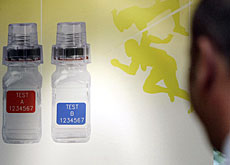Anti-doping agency wants greater flexibility

The World Anti-Doping Agency (Wada) has called for more flexible sanctions against athletes involved in doping.
Addressing a seminar in Lausanne on Wednesday, Wada chief Dick Pound said he would like to get tougher on serious doping offenders and suppliers while allowing more leniency in minor, accidental cases.
Together with its stakeholders, Wada is revising its 75-page global code, which sets out anti-doping rules, procedures and sanctions. The code will go through two more revisions before being put up for approval at Wada’s world anti-doping conference in Madrid in November.
“There is a significant shift in terms of how more minor cases can be dealt with. It gives [the code] more flexibility,”explained Wada Director General David Howman. “It has more to do with differentiating major and minor breaches of doping.”
The agency says the code was always intended to be a “living document” ready for change, although the fundamentals are likely to remain untouched.
“We are trying not to weaken our stance, but we feel a bit awkward imposing a two-year ban on someone who, when all is said and done, has not been doping,” Pound said.
Sanctions
Under current anti-doping regulations, athletes who test positive for a substance or method in Wada’s annually revised prohibited list receive a mandatory two-year ban for a first serious offence and a lifetime ban for a second.
Howman said the two-year ban would continue to apply for “serious” substances such as EPO and anabolic steroids. Lesser sanctions would only be possible for substances such as cannabis, which is included on Wada’s “specified substances” list, and stimulants including amphetamines.
At the same time, the agency is looking at going beyond the maximum two-year suspension for some first cases of steroid abuse.
“We will take into account the long-term benefits of some doping methods when we assess sanctions,” Pound said.
Entourage
International Olympic Committee President Jacques Rogge, who was also present at the seminar, described how a better job was being done overall of catching people and that there was more cooperation between government and sport.
But this is not enough, according to Rogge: “We are trying to fix a situation that is almost impossible to measure or to monitor all the time. All we know is that the fight against doping is more important than ever.”
While urging people to speak out against doping, Rogge called for greater unity and for improved random and targeted testing as well as effective, appropriate penalties.
“We must ban support personnel who have been caught and convicted of helping athletes dope,” he declared. “And, if needed, we must sanction the bodies which govern sport if they fail to discourage the culture of doping.”
Rogge said greater efforts must be made to uncover doping networks and insisted that sponsors do more to discourage drug use.
“The commercial influence in sport continues to grow. Are sponsors doing enough to create an environment where doping is discouraged? I don’t have the answer,” he said. “It may be that [anti-doping] cancellation clauses in endorsement contracts are not enough.”
Admission
Rogge also welcomed former cycling world champion Johan Museeuw’s admission on Tuesday that he resorted to doping during the last year of his career.
“If he admits, that is an intelligent thing to do,” Rogge said.
The 41-year-old Belgian, considered the greatest one-day cyclist of the past 15 years, had told a news conference that he had resorted to illegal practices. For years he had denied doping.
“I did things which were not 100 per cent by the rules,” he said.
swissinfo, Simon Bradley in Lausanne
Wada’s 2007 budget: SFr28.67 million ($23 million)
The agency’s headquarters are located in Montreal, Canada.
Four regional offices in Lausanne, Tokyo, Cape Town and Montevideo facilitate the agency’s work around the globe.
Wada’s world anti-doping conference takes place on November 15-17, 2007 in Madrid, Spain.
Following the 1998 Tour de France doping scandal, the Lausanne-based IOC decided to convene a world conference on doping, bringing together all parties involved in the fight against doping.
The conference took place in Lausanne in February 1999 and produced the Lausanne Declaration on Doping in Sport, which provided for the creation of an independent international anti-doping agency to be fully operational for the 2000 Olympic Games in Sydney.
Wada was established on November 10, 1999 in Lausanne to promote and coordinate the fight against doping in sport internationally.
The agency was set up as a foundation under the initiative of the IOC with the support and participation of intergovernmental organisations, governments, public authorities and other public and private bodies fighting against doping in sport.
Wada coordinates the development and implementation of the world anti-doping code, the document harmonising anti-doping policies in all sports and all countries.
The agency focuses on seven areas: code acceptance, implementation and compliance monitoring; science and medicine; anti-doping coordination; anti-doping development; education; athlete outreach; and out-of-competition testing.

In compliance with the JTI standards
More: SWI swissinfo.ch certified by the Journalism Trust Initiative












You can find an overview of ongoing debates with our journalists here . Please join us!
If you want to start a conversation about a topic raised in this article or want to report factual errors, email us at english@swissinfo.ch.